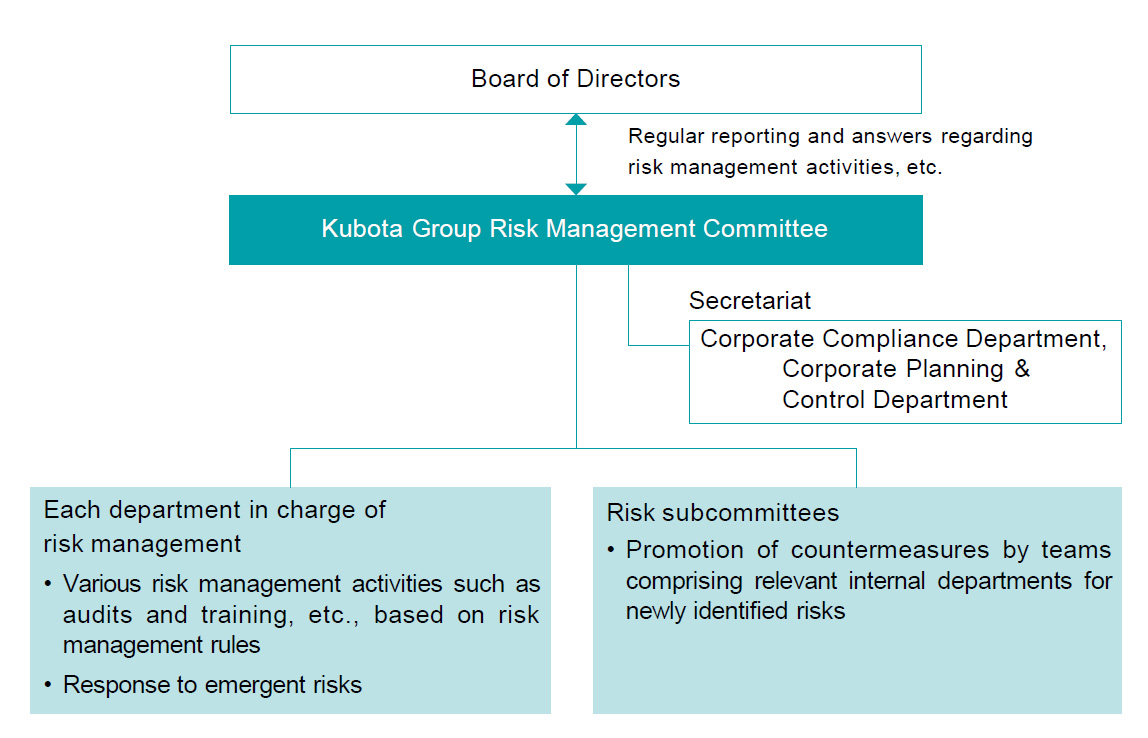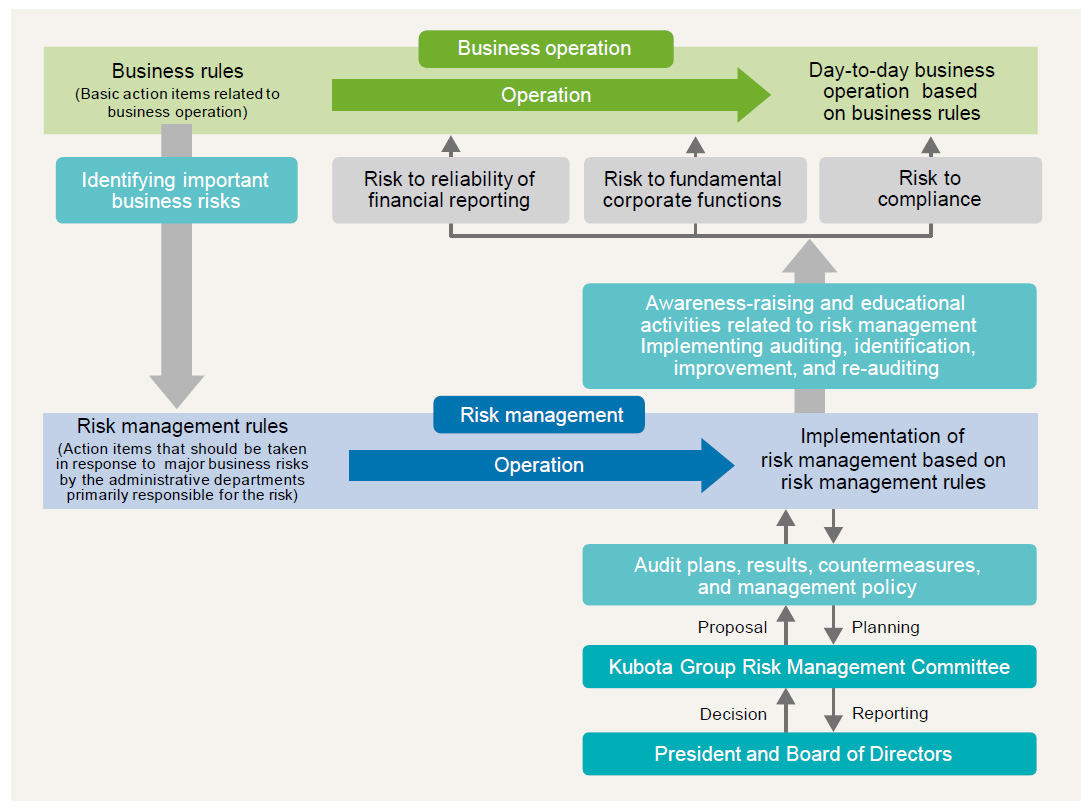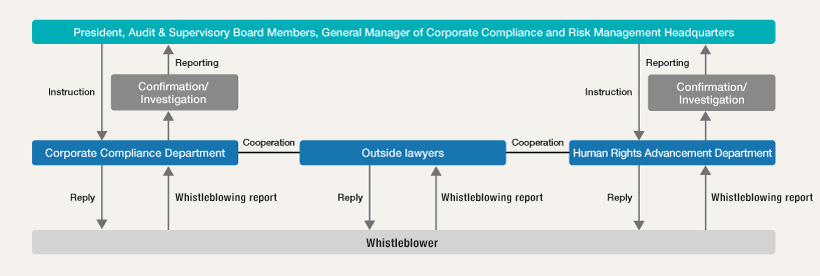Internal Control System
For Kubota Group, its internal control system serves as the mechanism for clearly providing the rules that should be abided by as to the performance of business, and for checking whether or not business has been managed according to those rules. This system consists of the business operation on one hand, which entails the management of major business risks.
“Bsiuness operation” refers to the notion that basic action items necessary for operating businesses should be set out as “business rules.” The notion also requires that each department should conduct its day-to-day checks in accordance with the “business rules.” “Business rules” consists of general business rules (basic rules) on one hand and functional business rules on the other.
Risk management refers to the notion that “risk management rules” should set out appropriate operational action items that all administrative departments should implement, to the extent that the administrative departments are primarily responsible for some risks. The notion also requires that those departments should identify promotional action items to manage the risks. The notion further requires that auditing should be conducted on appropriate business departments to verify the effectiveness thereof.
In the internal control system, major risks in Kubota’s business are classified into the following three categories:
- Internal control over reliability of financial reporting
- Internal control over the fundamental functions of the company, such as fair trade, environmental conservation, and health and safety
- Internal control over compliance, such as compliance with laws and regulations related to equipment, and import and export control
To avoid these risks, each department in charge implements necessary actions to be promoted and conducts audits of the relevant operational division, and reports the results and the measures for the next fiscal year to the President and the Board of Directors. Thus the PDCA cycle for risk management is implemented properly.
Internal Control System Overview
Kubota Group Risk Management Committee
In view of the changing public expectations regarding corporate risk management, to adapt to these changes the Kubota Group Risk Management Committee maintains existing risk management activities relating to internal control risk, ascertains new risks with potential major impact on business operations, and takes countermeasures.
The committee undertakes regular risk assessments of the Kubota Group, and after conducting a risk assessment, it determines new risks to be addressed as a priority. In addition, subcommittees under the supervision of the Kubota Group Risk Management Committee implement risk response measures and regularly report back to the committee on their progress. The committee monitors these and issues instructions where necessary.
-

System Diagram
Internal Control System Operation Activities (Risk Management Activities)
Kubota considers its risk management activities as part of its business activities. Based on its understanding that risk management is the foundation of business activities, Kubota is willing to exert its efforts to manage risks appropriately through continuous steady improvement via “immediate corrective actions upon any perception of inadequacies,” by identifying risks common to the entire Kubota Group, such as those relating to the reliability of financial reporting. At the same time, while accelerating the global development of its businesses, Kubota strongly recognizes that risk management activities are the foundation for the continuity of its businesses, and strives to improve such activities both in Japan and overseas.
Number of Audits and Contents of Risk Management
| Risk management items | Risk to be avoided |
Number of audited items for FY2023*1 | |
|---|---|---|---|
| Internal control over reliability of financial reporting |
Financial reporting | · Risk to reliability of financial reporting | 7,882 |
| Internal control over the basic functions of the company |
Fair trade | · Bid-rigging and price fixing · Unfair trading concerning trading with distributors, etc. · Non-compliance with the Subcontract Act |
113 |
| Environmental conservation |
· Non-compliance with laws and regulations · Environmental accidents · Past environmental debt |
12,597 | |
| Health and Safety | · Occurrence of serious accidents · Occupational illnesses · Administrative disposition and litigations |
1,568 | |
| Quality assurance | · Occurrence of quality problems detrimental to the Kubota brand, etc. | 413 | |
| Labor management | · Breach of duties of care as to safety of employees · Improper management of working conditions · Improper management of part-time employees, contractors and agency employees · Occurrence of labor problems outside Japan |
7,675 | |
| Information security | · Computer virus infection · Information leakage · Information system failure |
3,499 | |
| Intellectual property | · Infringement of other companies’ intellectual property | 772 | |
| Internal control over compliance |
Compliance with laws and regulations related to equipment |
· Non-compliance with laws and regulations of the Building Standards Act, the Fire Service Act, and the Industrial Safety and Health Act, etc. in connection with assets and facilities owned by Kubota | 620 |
| Earthquake and other disaster response management |
· Important managerial losses including danger to human lives due to earthquakes and other disasters, damage to equipment, and destruction of the information system | 68 | |
| Compliance with the Construction Business Act |
· Non-compliance with the Construction Business Act | 586 | |
| Human rights advancement*2 |
· Occurrence of human rights violation issues | - | |
| Safe driving management |
· Accidents arising from non-compliance with traffic laws and regulations and violating acts | 138 | |
| Prevention of illegal payments |
· Trading with antisocial forces · Non-compliance with the Political Funds Control Act · Making inappropriate payments to overseas public servants |
21 | |
| Classified information management |
· The leakage of classified information including a development plan for a new product and sales plan | 320 | |
| Protection of personal information |
· Leakage and loss of personal information related to customers, employees, etc. · Improper use of personal information |
228 | |
| Import and export control |
· Non-compliance with laws and regulations related to importing and exporting, including the Customs Act, the Foreign Exchange and Foreign Trade Control Law, the Basel Convention, and laws related to chemical substances | 105 | |
| Compliance with laws and regulations related to logistics |
· Non-compliance with the three major road laws, including the Road Traffic Act; and with the laws and regulations related to logistics activities, including the Labor Standards Act, etc. | 623 | |
- *1.Number of audited items is a sum of the number of items audited in each of the divisions subject to audit.
- *2.Activities for human rights advancement focused mainly on training, the release of information, and the follow-up of survey results.
Kubota Hotline (whistleblowing system)
As a framework to support risk management, Kubota operates a whistleblowing system. This system aims to prevent, or quickly detect and correct, any illegal or unethical acts as well as to develop an open corporate culture.
Aside from this system, Kubota also operates an Audit & Supervisory Board member hotline for reporting of matters relating to Kubota directors and a supplier hotline for our outside business partners.
Types of contact points and matters handled
- Corporate Compliance Department: Compliance issues other than human rights (anonymous reporting acceptable)
- Human Rights Advancement Department: Issues of human rights (anonymous reporting acceptable)
- Outside lawyers: Compliance in general including human rights issues
- Human Rights Advancement Consultation Office has been established at each company and business site so that people can more easily seek consultation.
Available to
- Full-time, part-time and temporary employees of Kubota and its Group companies in Japan
- In line with the legislative change, the system was extended in April 2022 to directors and retired employees (within one year).
- Each overseas base handles whistleblowing reports individually and notifies the Kubota head office of any significant ones.
- Starting from 2017, all whistleblowing cases in China are reported to the Kubota head office.
- We also started operating a global hotline focusing on certain significant risks at some sites.
Protection of informants
The Whistleblowing System Operation Rules clearly state: Additionally, the staff at each base who handle reports are required to sign a strict confidentiality agreement.
- “the informer shall not be disadvantaged as a result of reporting an issue.”
- “excluding cases necessarily requiring investigations and official reporting, the content of the reported issue, personal information obtained during investigations, and all other information shall not be used or disclosed.”
Activities to raise awareness of the system
Various creative ways have been employed to alleviate unease about the system, which is often the result of a lack of understanding.
The Company newsletter and website provide information on:
- The number of reports received for each content category, and past cases (outline)
- The flow of processes for using the whistleblowing system
- The objective of the system, protection of whistleblowers, handling of anonymity, etc.
Number of cases reported (in Japan)
- Jan.–Dec., 2016 30 cases
- Jan.–Dec., 2017 52 cases
- Jan.–Dec., 2018 71 cases
- Jan.–Dec., 2019 59 cases
- Jan.–Dec., 2020 74 cases
- Jan.–Dec., 2021 122 cases
- Jan.–Dec., 2022 100 cases
- Jan.–Dec., 2023 118 cases
- Including enquiries and matters that were found not to be problematic as a result of investigation
Other
Moreover, a write-in column is available for every employee to freely make comments, if any, in the Kubota Group Employee K-ESG Awareness Survey (from 2024 the Compliance Awareness Survey), which is answered anonymously. The column provides an opportunity for employees to give their frank reports and opinions, enabling the Company to develop an open corporate culture.
Flowchart of Kubota Hotline
Ensuring the Reliability of Financial Reporting
To ensure the reliability of financial reporting for the Kubota Group overall, including overseas subsidiaries, we have established and operate an internal control system. Moreover, to confirm its effectiveness, the Corporate Auditing Department and the auditing divisions of subsidiaries conduct regular internal audits. Based on the results of these audits, we have built a system for evaluating the effectiveness of internal controls on a consolidated basis in conformance with the internal control and reporting system (J-SOX), etc., pertaining to financial reporting as stipulated by the Financial Instruments and Exchange Act.
Compliance with the Anti-Monopoly Act/Competition Law
We realize that full implementation of compliance is key to establishing Kubota as a Global Major Brand. The Kubota Group therefore engages in the risk management activities set out below to ensure prevention of any infringement of Japan’s Anti-Monopoly Act and the competition laws of overseas countries as well as the Subcontract Act.
System
The Company’s internal rules relating to Japan’s Anti-Monopoly Act, competition laws and the Subcontract Act are the Rules on Competition Laws Compliance and the Rules on Subcontract Act Compliance. Under these rules, we have established the Competition Laws Compliance Committee and the Subcontract Act Compliance Committee, each with members elected from Kubota and Kubota Group companies’ relevant departments. These committees promote measures to prevent violations of their respective laws and regulations.
Education and Enlightenment Activities
Kubota continuously offers training programs on the Anti-Monopoly Act/Competition Law at its business divisions as well as its Group companies both in Japan and overseas, for enlightenment and awareness-raising to ensure compliance. Legal training programs, which cover a broad range of legal matters including competition laws, are also provided for employees who are to be dispatched to overseas Group companies as managers.
Audits
Kubota continuously conducts audits under the Anti-Monopoly Act, including on-site inspection, targeting Kubota and its Group companies in Japan. For overseas Group companies, Kubota conducts written audits, on-site interviews, and opinion exchange meetings, through which it determines the status of risk management.
Maintaining and Expanding the Consultation System
The Company has stipulated the reports and consultations to be undertaken based on the Rules on Competition Laws Compliance and the Rules on Subcontract Act Compliance, should it be judged that a Kubota Group officer or employee has violated, or is in suspicion of having violated the relevant laws and regulations, or in any other case where it is necessary, and maintains a consultation system for both emergencies and normal times.
Prevention of Illegal Payments
The Kubota Group is engaged in efforts to prevent any corrupt practices. It has placed particular focus on preventing bribery among risk management activities on the preventing of illegal payment, and will work to achieve SDGs Target 16.5: Substantially reduce corruption and bribery in all their forms.
Amid increasing international moves to anti-bribery, we marked December 9 – designated by the United Nations as International Anti-Corruption Day – by broadcasting a President’s Message to all Kubota Group officers and employees every year. In the message, our top management made a clear commitment by declaring that ‘KUBOTA Group never allows business based on unfair practices such as bribery.’
As part of its activities to prevent corruption, the Kubota Group conducts wide-ranging education and awareness-raising activities for officers and employees. Specifically, in bribery prevention education for officers and employees, we conduct training sessions and e-learning in Japan and overseas. These include explanations of laws and regulations in each country, as well as the status of execution, and a number of case studies to improve understanding. The training is held regularly on an ongoing basis to ensure circulation of the latest information and cultivate an awareness of bribery prevention.
Furthermore, we have prepared a handbook*, and we issue newsletters throughout the year, among various measures to introduce various information such as laws, regulations, and case studies related to bribery prevention, embezzlement, and facilitation payments, etc., to the entire Group in and effort to prevent bribery and ensure widespread awareness.
In addition, as an initiative directed outside the company, a ‘Request to Suppliers’ was posted on the Kubota website in the name of the General Manager of the Corporate Compliance and Risk Management Headquarters. The text outlined to suppliers the Kubota Group’s approach to bribery prevention and asked for their understanding and cooperation in bribery prevention activities.
As a new initiative, from the end of 2023, we have rolled out operation of a global hotline for overseas bases. In this way, we are working to enhance our internal reporting system with the aim of facilitating early detection and prevention of bribery and other improper activity.
To verify these risk management activities, the Kubota Group has established the Committee on Prevention of Illegal Payments *2 and it carried document surveys which were conducted to investigate whether preventive frameworks were in place and sufficiently functioning, as well as whether there were any illegal payments.
The policies for these risk management activities and the results are periodically reported to the Board of Directors through the Kubota Group Risk Management Committee. Based on the feedback provided, the content of risk management activities is reviewed to improve the overall level.
- *1.We have put together a Kubota Group Handbook for Anti-Bribery which is being issued across the entire Group. The Handbook is issued in a global version with universal content available in Japanese, English, French, Chinese, and Thai, and in individual country versions that supplement the universal content with more detailed information on the points to be noted and actions to be taken in the particular country or region. These are available for China, Thailand, Korea, Indonesia, Myanmar, the Philippines, Vietnam, and Mexico.
- *2.12 companies in Japan and 33 overseas bases were surveyed in FY2023
- The Kubota Group Anti-Bribery Policy (excerpt)
-
As specified in the Kubota Group Charter for Action, we commit ourselves to “conducting corporate activities based on compliance with legal regulations and ethical principles.” As such, Kubota Group never allows business based on unfair practices such as bribery. The Group also strictly prohibits all of its companies, officers and employees from being involved in bribery.
President, Kubota

